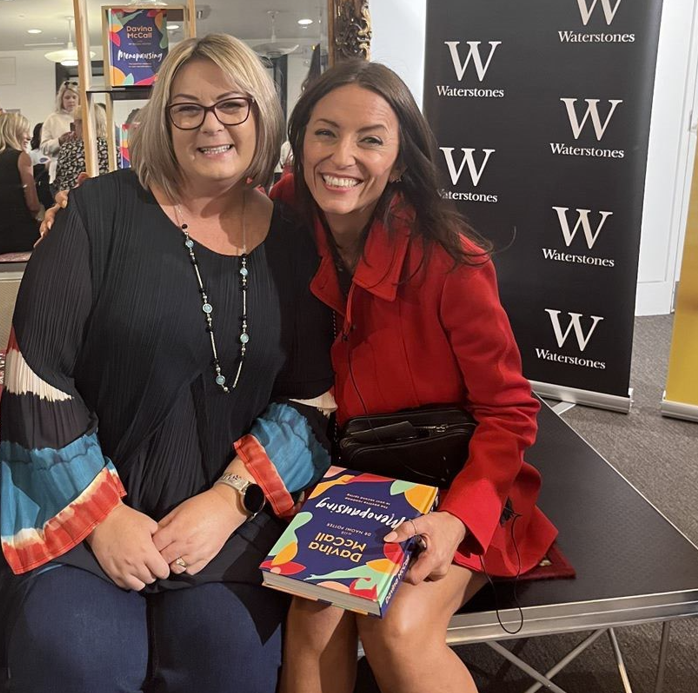- OT
- Professional support
- Optical organisations
- Making menopause normal at Specsavers
Perspectives
Making menopause normal at Specsavers
Louise Furby, creator of Specsavers’ MenoTalk network, on the importance of allyship and open conversations beyond Menopause Awareness Month


Louise Furby
11 October 2023
Specsavers’ menopause support group, MenoTalk, now has nearly 400 members. One of the most prominent things we have achieved in the past 18 months is menopause in the workplace accreditation, which we were awarded in July 2023. An independent panel assessed our credentials against six topics, including culture, policy, and facilities. The accreditation means we have made a commitment, and we’ve now got a bigger spotlight on ourselves. We’ve upped the bar.
As part of the accreditation activity and after receiving feedback on areas where we could potentially evolve, we’ve worked up a structured plan for the MenoTalk group over the next 12 months, which includes World Menopause Day activities. It has enabled us to structure the projects and activities that we want to deliver, based predominantly on accreditation panel and member feedback.
One of our biggest projects is the Meno Toolkit, enabling managers and colleagues to make adaptations to their normal working practices, so they have solutions in place to help manage menopause symptoms. In the support office, that could mean providing solutions for somebody who spends a lot of time in front of a computer and is struggling with memory recall, which is a key symptom in menopause. This might be using [task management app] Microsoft To Do, or recording meetings – simple, practical steps that can help them manage symptoms and feel less anxious about the things they’re struggling with.

For store teams, it’s probably quite different, because they don’t sit in front of a computer. Their considerations are probably around access to the right sanitary products, for instance, and the ability to take breaks and be flexible.
We always say that whilst we provide the basics and the standard practice guidance and information around menopause, actually, everybody should be treated individually, whether they’re in a store, a support office, a warehouse, or anywhere else in our business. What one person experiences through menopause might be very different to what the next person experiences. The Meno Toolkit is there to support current experiences and manage any challenges that individuals are facing, whether they be physical, cognitive or psychological, but also to help managers to initiate those conversations.
There is plenty that colleagues can do themselves. We want to help people feel confident about having those conversations with their managers, so they can come to a reasonable agreement around what adaptations can be made, and how often they’re reviewed. We set out to make the topic open and conversational. I think we’ve achieved that.
What one person experiences through menopause might be very different to what the next person experiences
Widening the conversation
Menopause in the workplace has become a hot topic, but we’re mindful that it needs a societal solution, so we also want to start educating the younger members of our business. We saw a real interest from our 20– 25 age group on World Menopause Day 2022. Their interest was around understanding what their mums were going through. They didn’t want to ask questions specifically, but they wanted to be informed.
We recognise that engaging this demographic aids their current experience of menopause through their relationships. They are also a good starting point for education, so they can prepare themselves for that period. We now know that menopause doesn’t specifically happen between 45 and 55; it can be a lot broader than that. It’s good future-proofing for us to be able to educate and help that generation prepare.
We’ve also launched a community site, Make Menopause Matter, for everybody in the business, where we share information and news about menopause. The idea is that, if somebody doesn’t want to be a member of MenoTalk, we’re still educating them. They still have access to information and guidance around that topic.
Hopefully, we’re reiterating the point around being comfortable talking about menopause. The site is a continual feed of information, and we also share resources around specific menopausal symptoms, so if somebody does have a particular symptom that they want to understand, but they don't feel confident enough to open a conversation with a group member, they can research it on our site.
The main thing we’re promoting on World Menopause Day this year is a campaign called Mention MenoTalk. The aim is to tell everybody that the group exists, and to nominate somebody to join. It’s about broadening the knowledge base and opening the conversation.
We have people in MenoTalk who look at the content and discussions, but don’t necessarily contribute. Often, male members of the group are more comfortable watching and reading. Getting more people to join gives us the opportunity to educate and inform around the topic, which is vast and always evolving. Mention MenoTalk will enable further practice and manufacturing and development team engagement.
We’ve also launched two training modules, one for colleagues and one for managers, as well as some bite-sized training, which enables somebody who might not want to spend 30 minutes learning the detail of menopause to just get the basics and start conversations.
Longer term, we’re looking at how we can incorporate menopause into our broader development programmes. We have a focus on male allyship. We’re mindful that everybody is affected by menopause, but the assumption is that it’s only women. It’s not; it’s men as well. We know from anecdotal feedback that some of the information we’ve shared has helped colleagues have conversations with their partners, to understand what’s going on at home too.
We have had new colleagues telling us that seeing the MenoTalk group was a positive reason to join Specsavers
A long-term change
We get a lot of feedback around how easily colleagues have been able to address challenges, for example in an environment where they feel overwhelmed or hot. I think two years ago that would have gone unspoken, whereas now we have members who feel more confident saying, “I’m having a menopausal flush, I need the air con turned up.”
Our women’s group is doing a great deal around period awareness, too. We’ve worked with them, in our support offices, to launch sustainable period products, to make life a little bit easier. We’ve also introduced a menstruation policy, and we’ve had fantastic feedback around that.
Resources
We also can’t forget that only one in four women experience severe menopause symptoms. There is a core group of people who go through menopause without having any severe or negative experiences. That is also something we’re going to talk about more: the positives. We’ve focused on the bad, to get that message out there. But actually, there are some really good things that you experience once you’ve gone through menopause, too.
We have had new colleagues telling us that seeing the MenoTalk group was a positive reason to join Specsavers. I probably get two or three emails a month from individual members, saying, “I’m so glad you’ve got MenoTalk set up. It’s brilliant to know that I don’t feel isolated; I don’t feel judged anymore. It’s good to hear other people’s stories, so you don’t feel like you're the only person having these problems.”
The business is showing commitment to supporting and developing our credentials within the whole diversity and inclusion space, but specifically within menopause. We did a panel with senior leaders at World Menopause Day last year, and the feedback was that seeing somebody senior openly talking about their own experiences made colleagues feel heard and understood. One of the very challenging symptoms with menopause that a lot of people experience is anxiety: women feeling like they’ve lost themselves. Those open, transparent conversations help people to feel a bit less like they need to hide what they’re experiencing.
- As told to Lucy Miller
Advertisement
More Perspectives
-
“The onus is on the provider to design their qualification as they see fit”
-
“People living in care homes experience some specific barriers in access to care and this needs to change”
-
“It is important for ECPs to understand what they need to look for in myopia management studies”
-
“Where the responsibility lies is a key question that needs to be answered though these developments”

Comments (0)
You must be logged in to join the discussion. Log in